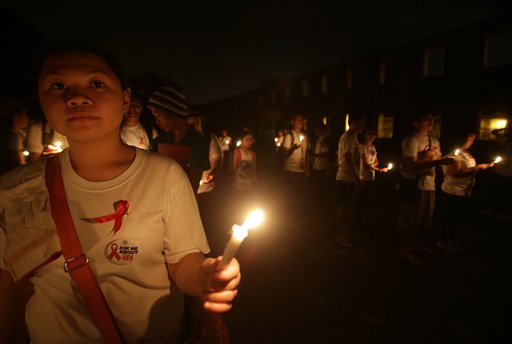New HIV cases highest recorded in one month

A volunteer of the Manila Red Cross Youth hold candles as they observe World AIDS Day in Manila, Philippines on Sunday, Dec. 1, 2013. AP
MANILA, Philippines—Almost 500 new cases of the human immunodeficiency virus (HIV), which could lead to the fatal acquired immune deficiency syndrome (AIDS), were reported in October, according to the Department of Health (DOH).
Data from the Philippine HIV and AIDS Registry showed 491 new HIV cases reported in October—the highest number reported in one month since 1984.
Today marks the 25th observation of World AIDS Day, promoted as an opportunity for people worldwide to focus on the effects of the HIV-AIDS epidemic and to unite in the fight against it.
The latest figure is a 66-percent increase over the 295 cases reported in the same period last year.
The 491 new cases bring to 4,072 the number reported since January this year and to 15,774 the total recorded since 1984.
Full-blown AIDS
Thirty-eight of the cases in reported in October, the registry showed, were full-blown AIDS.
Most of the new cases were reported in the National Capital Region, Central Luzon, Calabarzon, Central Visayas and Davao.
Ninety-four percent of those who contracted AIDS were male, of whom 60 percent were in the 20-29 age group.
Of the 491 new cases, 445 were contracted through unprotected sex, with men having sex with other men. Forty-five were infected through needle sharing among injecting drug users, while one was a case of a mother-to-child transmission.
Ninety-two percent of the cases were asymptomatic at the time of reporting, the DOH noted.
Mostly male
A total of 148 deaths were reported from January to October this year. Of this number, 141 were male.
The highest number of deaths occurred in the 25-29 age group, followed by the 30-34 and the 35-39 age groups, the DOH said.
In October alone, five deaths were reported, it added.
As of October, there have been 5,141 people living with HIV who were reported to be undergoing antiretroviral therapy, the DOH said.
Contracting HIV leads to a condition characterized by the weakening or breakdown of the body’s immune system.
Meanwhile, the World Health Organization (WHO) has issued new guidelines aimed at increasing testing, counseling, treatment and care for adolescents, both for those living with HIV as well as those who are at risk of infection.
“More than two million adolescents between the ages of 10 and 19 are living with HIV, and many do not receive the care and support they need to stay in good health and prevent transmission. In addition, millions more adolescents are at risk of infection,” the WHO said in a statement.
“The failure to support effective and acceptable HIV services for adolescents has resulted in a 50-percent increase in reported AIDS-related deaths in this group compared to the 30-percent decline seen in the general population from 2005 to 2012,” it added.
The WHO urged governments to review their laws to make it easier for adolescents to obtain HIV testing without needing the consent of their parents.
Social pressures
“Adolescents face difficult and often confusing emotional and social pressures as they grow from children into adults,” said Dr. Gottfried Hirnschall, director of the WHO HIV/AIDS Department.
“Adolescents need health services and support tailored to their needs. They are less likely than adults to be tested for HIV and often need more support than adults to help them maintain care and to stick to treatment.”
RELATED STORIES:
Number of adolescents with HIV jumps by one-third—UN
AIDS epidemic’s end by 2030 seen – UN official














